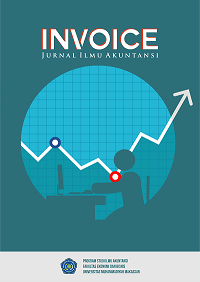ANALISIS LAPORAN PENDAPATAN DAN BIAYA DALAM MENUNJANG PENINGKATAN LABA PADA HOTEL SANTIKA MAKASSAR
DOI: https://doi.org/10.26618/inv.v1i2.2517
Abstract
Hasil penelitian menunjukkan bahwa sistem pencatatan akuntansi Hotel Santika Makassar menggunakan metode basis akrual dalam mengakui pendapatan dan biaya, dimana transaksi dan peristiwa diakui pada saat terjadinya transaksi, tidak harus menunggu sampai kas diterima ataupun dikeluarkan. Pendapatan dan biaya diakui pada saat terjadinya transaksi, sehingga informasi yang diberikan lebih handal dan terpercaya walaupun kas belum diterima. Besarnya laba yang terealisasi dibandingkan laba yang direncanakan karena adanya renovasi gedung hotel selama tahun 2015 hingga 2017 yang akan menyebabkan kurangnya jumlah pengunjung yang datang dan besarnya biaya yang dikeluarkan.
The results show that the accounting system of Hotel Santika Makassar uses accrual basis method in recognizing income and costs, where transactions and events are recognized at the time of the transaction, do not have to wait until cash is received or issued. Revenues and costs are recognized at the time of the transaction, so that the information provided is more reliable and reliable even though cash has not been received. The amount of profit realized compared to the planned profit due to the renovation of the hotel building during 2015 to 2017 which will cause a lack of the number of visitors coming and the amount of costs incurred.References
Aris Kurniawan, (Post 27 April 2016). Pengertian Pendapatan Menurut Para Ahli Beserta Jenisnya. Diakses 20 Maret 2018, dari http://www.gurupendidikan.co.id/pengertian-pendapatan-menurut-para-ahli-beserta-jenisnya/
Ashari, Muhammad Hasyim dan Mohammad Rofiudin. (2017). Implementasi PSAK No. 23 Terhadap Pengakuan Pendapatan Jasa pada Industri Perhotelan dan Pengaruh Kewajiban Perpajakannya (Studi Kasus pada Hotel GMP di Malang). UNMER Malang. Fakultas Teknologi Informasi. ISSN: 2597-4696
Barus, Irene Sukma, dkk (2016). Analisis Pengaruh Beban Operasional pada Pendapatan Usaha dan Dampaknya Terhadap Laba Bersih (Studi Kasus: Perusahaan Food and Beverage yang Terdaftar di BEI Periode 2010-2014). Conference on Management and Behavioral Studies. e-ISSN NO: 2541-2850.
Budiwibowo, Satrijo. (2012). Analisis Estimasi Cost-Volume-Profit (CVP) dalam Hubungannya dengan Perencanaan Laba pada Hotel Tlogo Mas Sarangan. ASSETS: Jurnal Akuntansi dan Pendidikan, Vol. 1 No. 1.
Duyo. F Sheila. (2013). Analisis Cost Volume Profit Untuk Perencanaan Laba pada Hotel Sintesa Peninsula Manado. Jurnal EMBA. Vol. 1 No. 3, Hal. 603-610
Fitaariyani, (Post Rabu 26 Mei 2016). Konsep Pendapatan (Teori Akuntansi). Diakses 20 Maret 2018, dari http://fitaariyani27.blogspot.co.id/2016/05/konsep-pendapatan-teori-akuntansi.html
Hotelier, (Post 09 Juni 2017). Cara Menghitung RevPar Dalam Bisnis Perhotelan. Diakses 26 Maret 2018, dari http://hotelier.co.id/cara-menghitung-revpar-dalam-bisnis-perhotelan/
Hotelier, (Post 11 Juni 2017), Cara Menghitung GOPPAR di Hotel. Diakses 26 Maret 2018, dari http://hotelier.co.id/cara-menghitung-goppar-di-hotel/
Hotelier, (Post 17 Juni 2017). Cara Menghitung CPOR di Hotel. Diakse 26 Maret 2018, dari http://hotelier.co.id/cara-menghitung-cpor/
Ikatan Akuntan Indonesia, (2002), Standar Akuntansi Keuangan, Penerbit Salemba Empat, Jakarta.
Lidia Mawikere (2014). Analisis Metode Pengakuan Pendapatan dan Beban Pada Koperasi “Listrik” PT. PLN (Persero) Wilayah Suluttenggo Menurut PSAK No. 27. Jurnal LPPM Bidang EkoSosBudKum, Volume 1 Nomor 2 Tahun 2014.
Rahmat, Muhammad Asyhari. (2013). Penerapan Target Costing dalam Penentuan Tarif Kamar Untuk Mengoptimalkan Perencanaan Laba (Studi Kasus pada UB Hotel Malang).
Rinda Yuliana (2008). Analisis Laporan Laba Rugi Departemen Kamar Pada Borneo Internasional Hotel Di Samarinda. Skripsi Akuntansi Perhotelan, Universitas Mulawarman Samarinda.
Rini Meilinda, Zilkarnain, MZ., Widodo (2015). Analisis Pengakuan Pendapatan dan Beban Serta Pengaruhn ya Terhadap Kewajaran Penyajian Laporan Keuangan Pada PT. Mitra Andalan Satkomindo. Jurnal Akuntansi.
Sisilia Merry Ratunuman (2013). Analisis Pengakuan Pendapatan Dengan Persentase Penyelesaian Dalam Penyajian Laporan Keuangan PT. Pilar Dasar. Jurnal EMBA Vol. 1 No. 3 Juni 2013, Hal. 576-584.
The Definisi, (Post April 2015). Definisi dan Pengertian Pendapatan Menurut Para Ahli. Diakses 20 Maret 2018, dari http://thedefinisi.blogspot.co.id/2015/04/definisi-dan-pengertian-pendapatan-menurut-para-ahli.html
Titi Sari (2014). Pengakuan Pendapatan dan Beban Serta Pengaruhnya Terhadap Laba Perusahaan Jasa Konstruksi. Jurnal Ilmu & Riset Akuntansi Vol. 3 No. 11.
Valen Abraham Lumingkewas (2013). Pengakuan Pendapatan dan Beban Atas Laporan Keuangan Pada PT. Bank Sulut. Jurnal EMBA Vol. 1 No. 3 Juni 2013, Hal. 199-206.
Venti Lunadewi, (Post Kamis 30 Juli 2015). Akuntansi Perhotelan. Diakses 20 Maret 2018, dari http://ventilunadewi.blogspot.co.id/2015/07/akuntansi-perhotelan.html
Wahyudi, Tri (2013). Pengakuan Pendapatan dan Biaya pada PT. Pembangunan Perumahan Cabang V Semarang. Skripsi. Fakultas Ekonomi Universitas Sebelas Maret Surakarta.
Yannik Ariyati (2016). Income Statement Analysis Department of Room to Goodway Hotel Batam. Jurnal Dimensi, 2016-journal.unrika.ac.id
Downloads
Published
Issue
Section
License
Authors who publish with Invoice: Jurnal Ilmu Akuntansi agree to the following terms:
-
Copyright Ownership
The copyright of all articles published in this journal remains with the author(s). However, the authors grant Invoice: Jurnal Ilmu Akuntansi the right of first publication with the work simultaneously licensed under a Creative Commons Attribution 4.0 International License (CC BY 4.0). This license allows others to share, copy, redistribute, adapt, and build upon the work for any purpose, even commercially, as long as proper credit is given to the original author(s) and the source. -
Licensing and Access
Invoice: Jurnal Ilmu Akuntansi provides immediate open access to its content on the principle that making research freely available to the public supports a greater global exchange of knowledge. All published materials are available freely without subscription or payment and can be accessed, downloaded, and reused by any user provided that appropriate attribution is given. -
Permission for Reuse
For uses not covered by the CC BY 4.0 license, such as commercial reprints, translations, or any form of adaptation without clear attribution, users must obtain written permission from the editorial team. Requests for such permissions can be directed to the editorial office at: [invoice@unismuh.ac.id]. -
Plagiarism and Originality
Authors are responsible for the originality of their submissions. All articles are screened for plagiarism using appropriate tools before acceptance. Manuscripts found to contain unoriginal content or infringing materials will be rejected or retracted as per journal policy.















